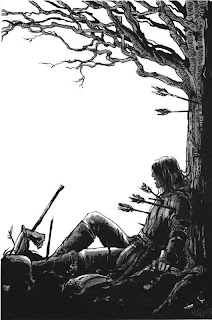The World As I See It
The Meaning of Life
What is the meaning of human life, or of organic life altogether? To answer this question at all implies a religion. Is there any sense then, you ask, in putting it?
I answer, the man who regards his own life and that of his
fellow-creatures as meaningless is not merely unfortunate but almost disqualified for life.
What an extraordinary situation is that of us mortals! Each of us is here for a brief sojourn; for what purpose he knows not, though he sometimes thinks he feels it. But from the point of view of daily life, without going deeper, we exist for our fellow-men--in the first place for those on whose smiles and welfare all
our happiness depends, and next for all those unknown to us personally with whose destinies we are bound up by the tie of sympathy. A hundred times every day I remind myself that my inner and outer life depend on the labours of other men, living and dead, and that I must exert myself in order to give in the same measure as I have received and am still receiving.
When we survey our lives and endeavours we soon observe that almost the whole of our actions and desires are bound up with the existence of other human beings. We see that our whole nature resembles that of the social animals. We eat food that others have grow, wear clothes that others have made, live in houses that others have built. The greater part of our knowledge and beliefs has been communicated to us by other people through the medium
of a language which others have created. Without language our mental capacities wuuld be poor indeed, comparable to those of the higher animals; we have, therefore, to admit that we owe our principal advantage over the beasts to the fact of living in human society. The individual, if left alone from birth would remain primitive and beast-like in his thoughts and feelings to a degree that we can hardly conceive. The individual is what he is and has
the significance that he has not so much in virtue of his individuality, but rather as a member of a great human society, which directs his material and spiritual existence from the cradle to the grave.
A man's value to the community depends primarily on how far his feelings, thoughts, and actions are directed towards promoting the good of his fellows. We call him good or bad according to how he stands in this matter. It looks at first sight as if our estimate of a man depended entirely on his social qualities.
And yet such an attitude would be wrong. It is clear that all the valuable things, material, spiritual, and moral, which we receive from society can be traced back through countless generations to certain creative individuals. The use of fire, the cultivation of edible plants, the steam engine--each was discovered by one man.
Only the individual can think, and thereby create new values for society--nay, even set up new moral standards to which the life of the community conforms.
Without creative, independently thinking and judging personalities the upward development of society is as unthinkable as the development of the individual
personalit without the nourishing soil of the community.
Friday, January 11, 2008
Subscribe to:
Post Comments (Atom)

No comments:
Post a Comment